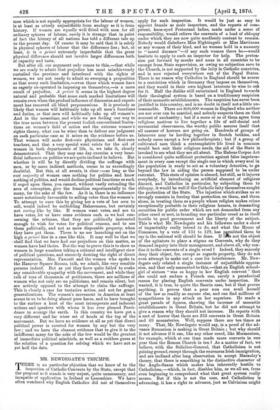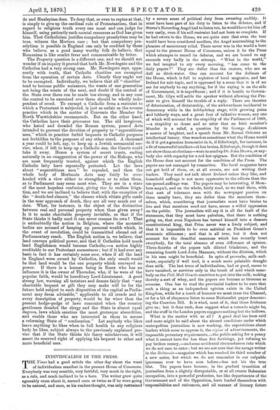MR. NEWDEGATE'S TRIUMPH. T HERE is no particular objection that we
know of to the inspection of Catholic Convents by the State, except that the proposal as it stands is very unjust, quite unnecessary, and incapable of application in Ireland or Lancashire. We have often wondered why English Catholics did not of themselves apply for such inspection. It would be just as easy to appoint female as male inspectors, and the reports of com- petent, keen-eyed Protestant ladies, made under a sense of responsibility, would relieve the convents of a load of obloquy under which they are now quite needlessly content to remain. Nobody would disbelieve Miss Nightingale or Miss Martineau or any woman of their kind, and no woman held in a nunnery in " moral durance "—if any such woman there be—would hesitate to apply to such an inspector for help. The preten- sion put forward by monks and nuns in all countries to be exempt from State supervision, as owing no subjection save to the Church, is not supported by the laity in Catholic countries, and is now rejected everywhere out of the Papal States. There is no reason why Catholics in England should be averse to a restriction which in Germany they impose on themselves, and they would in their own highest interests be wise to ask for it. Half the dislike still entertained in England towards their theological system is based on a traditionary suspicion of their monastic establishments. The suspicion has never been justified in this country, and is no doubt in itself not a little un- reasonable. There are 800,000 women in England who neither are nor ever can be married, and nobody suspects them on that account of unchastity ; but if a score or so of them agree from religious motives to live together a life of self-denial and ceremonial observances, the worthy public assures itself that all manner of horrors are going on. Hundreds of groups of labourers may be herding together in Scotch bothies, and nobody cares except a few philanthropists ; but if a group of cultivated men think a contemplative life lived in common would best suit their religious needs, the aid of the State is invoked to see what they are all about. The Habeas Corpus Act is considered quite sufficient protection against false imprison- ment in every case except the single one in which every soul in the population is ready to act as a voluntary detective, to go beyond the law in aiding the person supposed to be under restraint. This state of opinion is absurd, but still, as it injures everybody, by introducing an artificial element of religious discord, and Catholics in particular, by subjecting them to obloquy, it would be well if the Catholic laity themselves sought the protection of the State. The injustice which strikes us so strongly consists in forcing that protection on them, and them alone, in treating them as a people whose religion makes crime exceptionally probable in their religious houses, in demanding securities for public order which are not demanded from any other creed or sect, in branding one particular creed as in itself hostile to good government and the liberty of the subject. This is what Mr. Newdegate and his followers under a show of impartiality really intend to do, and what the House of Commons, by a vote of 131 to 129, hasitted them to say is the national will should be done. If not the object of the agitators to place a stigma on Convents, why do they demand inquiry into their management, and above all, why con- fine it to the convents of a single creed ? Indeed, they scarcely deny their object, for, except as regards property, they do not even attempt to make out a case for interference. Mr. New- degate only related a single instance of unjustifiable oppres- sion, and that only amounted to this,—that an English school- girl of sixteen " was so happy in her English convent " that she could not endure a French one, surely a paradoxical reason for placing English convents under inspection. He wanted, it is true, to quote the Saurin case, but if that proves anything, it proves that a poor nun can avail herself of the law as readily as anyone else, and can find millions of sympathizers in any attack on her superiors. He made a great parade of figures, showing the increase of monastic establishments in Great Britain, but he did not attempt to give a reason why they should not increase. He reports with a sort of horror that there are 233 convents in Great Britain and 69 monasteries. Well, suppose there are ten times as many. That, Mr. Newdegate would say, is a proof of the ad- vance Romanism is making in Great Britain ; but why should it not advance if it can, like any other creed, like Mormonism, for example, which at one time made more converts in one year than the Roman Church in ten ? As a matter of fact, we believe, with the Solicitor-General, that Catholicism is not gaining ground, except through the enormous Irish immigration, and are inclined after long observation to accept Macaulay's theory, that there is something in the distinctive character of the Anglo-Saxon which makes him inherently hostile to Catholicism,—which, in fact, disables him, as we all see, from even beginning to comprehend what that great system really means. But if this is not the case, and Catholicism is advancing, it has a right to advance, just as Calvinism might do and Hualeyism does. To deny that, or even to repine at that, is simply to give up the cardinal rule of Protestantism, that in regard to religious truth every one must and can judge for himself, using patiently such mental resources as God has given him. That Catholicism justifies compulsory proselytism may be true, witness the Mortara case ; but that compulsory pro- selytism is possible in England can only be credited by those who believe, as a good many worthy folk do believe, that Romanisra is like scarlet fever and communicable by letter.
The Property question is a different one, and we should not wonder if on inquiry it proved that both Mr. Newdegate and the Catholics had a very strong case. Mr. Newdegate says, appa- rently with truth, that Catholic charities are exempted from the operation of certain Acts. Clearly they ought not to be exempted. Individually, we believe that all " charities" tend to become public nuisances, the wants of one generation not being the wants of the next, and doubt if the control of the State over them can be made too strong, and in any case the control to be exercised over them should be wholly inde- pendent of creed. To exempt a Catholic from a restraint to which a Protestant is subjected, is just as unfair as the reverse practice which in the matter of Convents the Member for North Warwickshire recommends. But on the other hand, the Catholics have their grievance too. The old lawgivers, who hated and dreaded the Roman system, passed Acts intended to prevent the devotion of property to " superstitious uses," which in practice forbid bequests to Catholic purposes not forbidden to the purposes of any other creed. A thousand a year could be left, say, to keep up a Jewish ceremonial ser- vice, when, if left to keep up a Catholic one, the Courts could take it away. Hence a system of secret trusts, ending naturally in an exaggeration of the power of the Bishops, who are most frequently trusted, against which the English Catholic laity have repeatedly protested. Let the laws about " superstitious uses " be repealed, and then the whole body of Mortmain Acts may fairly be over- hauled with a view either to strengthen or to relax them, as to Parliament may seem most wise. They are in a state of the most hopeless confusion, giving rise to endless litiga- tion, and we are inclined to believe that, with the exception of the "death-bed clauses," the clauses which vitiate gifts made in the near approach of death, they are all very much out of date. What, for instance, is the object of the distinction between real and personal property when thus given away ? Is it to make charitable property invisible, so that if the State thinks it badly used it can never resume its own That is undoubtedly the notion in Belgium, where the monastic bodies are accused of heaping up personal wealth which, in the event of revolution, could be transmitted abroad out of Parliamentary reach. The English notion is, we believe, that land conveys political power, and that if Catholics held much land Englishmen would become Catholic,—a notion highly creditable to our Protestant earnestness ; but if it had ever any basis in fact it has certainly none now, when if all the land in England were owned by Catholics, the only result would be that land would be the one property which conveyed no power. If there is a human being in Essex who has no influence it is the owner of Thorndon, who, if he were of the popular faith, would be hereditary Lord-Lieutenant. A good strong law, warning all testators and donors fairly that " any charitable bequest or gift they may make will be for the future held subject to such disposition of the capital as Parlia- ment may deem advisable," applicable to all creeds and to every description of property, would be far wiser than the present hodge-podge of laws concocted when the country gentlemen dreaded the clergy and the State in almost equal degrees, laws which sanction the most grotesque absurdities, and enable those who are interested in them to accuse a reforming State of "confiscation." Let anybody who likes leave anything he likes when in full health to any religious body he likes, subject always to the previously explained pro- viso that if the State thinks his fancy mischievous, it will assert its reserved right of applying his bequest to other and more beneficial uses.



































 Previous page
Previous page